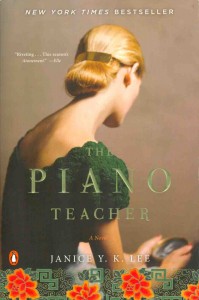 After finishing Janice Y.K. Lee’s ‘The Piano Teacher’ (2009, ISBN 978-0-14-311653-0), we went scurrying back to Han Suyin’s landmark novel of 1952, A Many-Splendored Thing. There are similarities, to be sure. The setting for both is pre-1955 Hong Kong, and they are essentially love stories that revolve around the unsettled military, political, and social situation that continually pokes, prods, threatens, and injures its inhabitants. This is the first novel for Lee, whose literary career includes stints as editor at Elle and Mirabella magazines, and it’s a good one, although it would be hard to believe she didn’t absorb Han’s book, which isn’t mentioned in the acknowledgements. We re-read ‘Splendored’ again right after this one, and the story lines parallel to a certain extent. While Lee doesn’t yet have Han’s descriptive capability, she handles the love portion of the story more realistically and less cloyingly. The protagonist in each book is a Eurasian woman, and each book describes how Eurasians were often treated as social outcasts. But enough about Han.
After finishing Janice Y.K. Lee’s ‘The Piano Teacher’ (2009, ISBN 978-0-14-311653-0), we went scurrying back to Han Suyin’s landmark novel of 1952, A Many-Splendored Thing. There are similarities, to be sure. The setting for both is pre-1955 Hong Kong, and they are essentially love stories that revolve around the unsettled military, political, and social situation that continually pokes, prods, threatens, and injures its inhabitants. This is the first novel for Lee, whose literary career includes stints as editor at Elle and Mirabella magazines, and it’s a good one, although it would be hard to believe she didn’t absorb Han’s book, which isn’t mentioned in the acknowledgements. We re-read ‘Splendored’ again right after this one, and the story lines parallel to a certain extent. While Lee doesn’t yet have Han’s descriptive capability, she handles the love portion of the story more realistically and less cloyingly. The protagonist in each book is a Eurasian woman, and each book describes how Eurasians were often treated as social outcasts. But enough about Han.
Lee covers two simultaneous plots, one taking place in 1941-1942, the other in 1952. Will Truesdale plays a major role in each, in love with Eurasian Trudy Liang in the first period, and having a relationship with Claire Pendleton in the second. Pendleton is a piano teacher who is introduced early on as a petty pilferer from her employer, an albatross that hangs over her head for the entire novel, yet never is quite brought to resolution. Truesdale seems torn between the two women for much of the book, and some of Lee’s most masterful writing describes Liang’s evolving relationship of him as Hong Kong increasingly falls under the wrath of Japanese occupation. Lee’s done her homework on the Japanese military’s increasingly draconian takeover, and the actions of the characters cooperating with the conquerors are magnificently written.
We found Trudy Liang, outwardly a gay party-girl, to be the most compelling character in the book. Her story drives the second part of the tale, which gathers its best momentum in describing her interaction with Otsubo, a Japanese officer who holds her fate — as well as that of her friends — in his hands. It’s Lee’s facility in addressing Hong Kong’s Japanese period that saves it from being “just another love story,” and puts some teeth in the book. Many memorable love stories have tragedy woven through them, and this one’s no different. The mark of a great character is that he or she will stick with you for a day or so after reading the book, and that was the case with us as far as Trudy Liang was concerned.
Overall, this is a very good book, one that will appeal equally to romantics, lovers of Hong Kong, and history enthusiasts. Lee’s got a talent for weaving it all together in a story that moves quickly, intelligently, and forcefully. Buy it now at the WoWasis eStore.
Leave a Reply